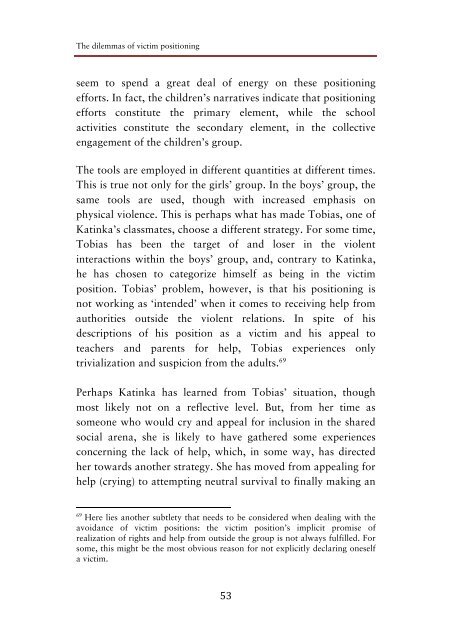Create successful ePaper yourself
Turn your PDF publications into a flip-book with our unique Google optimized e-Paper software.
The dilemmas of victim positioning<br />
seem to spend a great deal of energy on these positioning<br />
efforts. In fact, the children’s narratives indicate that positioning<br />
efforts constitute the primary element, while the school<br />
activities constitute the secondary element, in the collective<br />
engagement of the children’s group.<br />
The tools are employed in different quantities at different times.<br />
This is true not only for the girls’ group. In the boys’ group, the<br />
same tools are used, though with increased emphasis on<br />
physical violence. This is perhaps what has made Tobias, one of<br />
Katinka’s classmates, choose a different strategy. For some time,<br />
Tobias has been the target of and loser in the violent<br />
<strong>inte</strong>ractions within the boys’ group, and, contrary to Katinka,<br />
he has chosen to categorize himself as being in the victim<br />
position. Tobias’ problem, however, is that his positioning is<br />
not working as ‘<strong>inte</strong>nded’ when it comes to receiving help from<br />
authorities outside the violent relations. In spite of his<br />
descriptions of his position as a victim and his appeal to<br />
teachers and parents for help, Tobias experiences only<br />
trivialization and suspicion from the adults. 69<br />
Perhaps Katinka has learned from Tobias’ situation, though<br />
most likely not on a reflective level. But, from her time as<br />
someone who would cry and appeal for inclusion in the shared<br />
social arena, she is likely to have gathered some experiences<br />
concerning the lack of help, which, in some way, has directed<br />
her towards another strategy. She has moved from appealing for<br />
help (crying) to attempting neutral survival to finally making an<br />
69<br />
Here lies another subtlety that needs to be considered when dealing with the<br />
avoidance of victim positions: the victim position’s implicit promise of<br />
realization of rights and help from outside the group is not always fulfilled. For<br />
some, this might be the most obvious reason for not explicitly declaring oneself<br />
a victim.<br />
53


